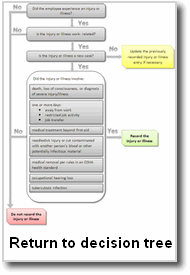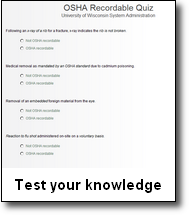Coordinators
A work-related injury or illness is deemed OSHA recordable if it results in one of the following:
Death
Work-related fatalities are OSHA recordable.
Your campus has an obligation to notify state regulators about the death of any UW System employee from a work-related incident within eight (8) hours of its occurrence.
- During normal business hours, contact the Department of Safety and Professional Services at 608-266-2112.
- During non-business hours, contact Wisconsin Emergency Management at 800-943-0003.
Worker’s compensation coordinators should verify who is responsible for their campus notification in these situations.
Loss of consciousness
Work-related loss of consciousness events are OSHA recordable.
Work-related loss of consciousness events must be entered into STARS, even in the case in which there is no medical treatment, restricted work, or days away from work. The work-related loss of consciousness event itself creates an obligation to record it as an injury for OSHA reporting purposes, and the STARS database serves as our OSHA injury and illness recordkeeping system.
Diagnosed significant injuries and illnesses
OSHA believes that most significant injuries and illnesses will result in one of the general recording criteria: death, days away from work, restricted work or job transfer, medical treatment beyond first aid, or loss of consciousness. These criteria can each be chosen as the severity code in your STARS database.
There are some significant injuries, such as a punctured eardrum or a fractured toe or rib, for which neither medical treatment nor work restrictions may be recommended. In addition, there are some significant progressive diseases, such as byssinosis, silicosis, and some types of cancer, for which medical treatment or work restrictions may not be recommended at the time of diagnosis but are likely to be recommended as the disease progresses.
OSHA believes that
- cancer,
- chronic irreversible diseases,
- fractured or cracked bones, and
- punctured eardrums
are generally considered significant injuries and illnesses, and must be recorded at the initial diagnosis even if medical treatment or work restrictions are not recommended, or are postponed, in a particular case.
However, there is not a “significant injury or illness” selection within the STARS severity codes. You should use (1) Medical Treatment Beyond First Aid for this circumstance.
[Note: This will not effect the accuracy of OSHA reporting, since the medical treatment criteria will be counted together with loss of consciousness events and lumped under the “Other recordable cases” category on OSHA’s 300 and 300A forms.]
Other references
OSHA Recordkeeping Handbook: For more information on recording criteria for cases of death, loss of consciousness, and diagnosed significant injuries and illnesses.


